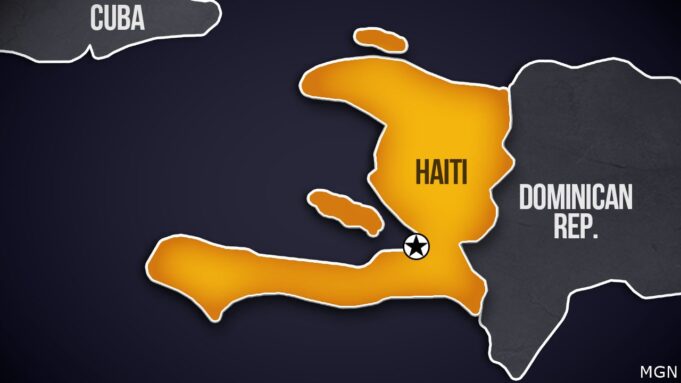Advocates, activists, and change agents have revived demands on France to pay restitution to Haiti for more than a century of forced “Independence Debt” Haitians paid to the French after prevailing against them in the Haitian Revolution in 1804.
Twenty years later in 1825, France demanded the so-called “debt” from its former slaveocracy for property losses—including its liberated slaves.
The matter was raised during the Third Session of the United Nations Permanent Forum on People of African Descent (PFPAD) held April 16-19 in Geneva, Switzerland.
Civil society representatives from over 85 countries convened at the Palais Des Nations—the UN Geneva headquarters under the theme “The Second International Decade for People of African Descent: Addressing Systemic Racism, Restorative Justice and Sustainable Development.” Justice advocates applauded the renewed demand for restitution.
“I think it is long overdue,” said Joseph Makhandal, the representative for the Nation of Islam to Haiti. “That France returns those funds, that forced independence debt that was imposed upon the Haitian people,” he said, speaking to The Voice of the Islands Podcast.
“Here’s a nation of people who fought valiantly to gain their independence on the battlefield … to defeat the greatest army that ever existed … the Napoleon army,” he explained. Others also agree the renewed demand is on time.
“I’m really excited that this might be an opportunity for Haiti’s claim to turn the corner,” said Brian ConCannon, executive director of the Institute for Justice and Democracy in Haiti.
“Haitian civil society,” he told The Final Call, “engaged with the UN Permanent Forum in a way that it never previously done.” He added, “I think they got a much better response by the world community.”
In a robust session on April 19, the issues of restitution and reparations were central from the Haitian Civil Society Delegation consisting of Haitians from Haiti and the diaspora. They laid out moving the claim forward.
They called on the UN Human Rights Council to work with Haitians to form an independent Truth and Reconciliation Commission to establish the facts surrounding past violence, as well as the current violence of armed groups.

They also called on UN member states to step up against Western racism that underpins how Haiti is mishandled on the world stage.
Jemima Pierre, professor at the Social Justice Institute at the University of British Columbia, reasoned that Western powers resent Haiti as a Black republic that achieved independence straight from the grip of enslavement.
“African American abolitionist Frederick Douglass once said of Haiti, ‘Haiti is Black and we have not yet forgiven Haiti for being Black.’ As one of the longest struggles in the world for Black liberation and anti-colonial independence, Haiti’s proud Blackness continues to shape the world response to its people,” said Ms. Pierre.
“It is this history and a deep racism that have shaped the Western world response to Haiti … allows the blatant disregard for Haiti’s claims to sovereignty,” she added.
Ms. Pierre explained it is racism that resents Haiti’s historical commitment to Black freedom, and claims that “Haitian people, Black people are not fit” to govern themselves. The nations of the UN, she contends, “especially those in the mother continent, Africa, must push the battle against racism inherent in the Western treatment of Haiti and Haitian people.”
She said specific processes must be established that stop the overwhelming Western meddling and control of Haitian affairs. She called for “environmental” and “financial” reparations from Western countries for harms stemming from foreign interventions like the cholera epidemic that killed thousands of Haitians, to Western roles in dismantling the Haitian state over the last two decades.
“Today, Haiti’s assertion of its sovereignty is an assertion of self-determination for all Black people. If Haiti is not free, none of us are free!” reasoned Ms. Pierre.
For many, the fact that France, a slave-maker and colonial power, demanded compensation for lost slave labor in the first place leaves them shaking their heads.
Notwithstanding, in a gangster-like action in 1825, France threatened to invade and reimpose slavery. Under military threat, Haiti agreed to pay a staggering 150 million francs—30 times Haiti’s annual revenue, and began obtaining loans from French banks, leading to an economic crisis.
It took Haiti 122 years to pay it off. By some accounts, Haiti doled out upwards of $30 billion by today’s value to French slaveholders and their descendants. It’s a disputed amount that some estimate is much higher.
“It’s $21 billion-plus 200 years of interest that France has enjoyed, so we’re talking more like $150 billion, $200 billion or more,” said Ms. Pierre to The Guardian.
For Haitian Canadian activist Jennie-Laure Sully, the forum was a step in the right direction. “Recommendations of this forum are important steps,” she said.
When some people ask what we can do to help Haiti, they often mean to say Haiti has no right to be a nation and should settle for being a neo-colony, she said.
“Afro-descendants must be aware of the fact that what is being done to Haiti will be done to other predominantly Black nations. There is nothing new there,” Ms. Sully told the forum.
“We must remember history in the fight against racism. It is not enough to say that Black lives matter. It is time for us to recognize that Black nationhood matters. Haiti’s nationhood matters,” she said.
“An important question that many in my country of adoption, Canada, have been asking me for years about my country of origin, Haiti [is] … what can we do to help Haiti? …. This is the wrong question. What does help even mean when big countries keep impoverishing smaller countries?
“Who truly believes that former colonizers can help or organize the help that should be given to their former colonies?” she said, pointing out that serious rights violations occurred while “help” was being given to Haiti. “Haiti was being helped to death,” said Ms. Sully. “Help is no substitute for restitution,” she added.
The issue of restitution for Haiti is intertwined with the wider call for reparatory justice for people of African descent. It is not a misnomer that across world regions Black people suffer the stench of centuries-old meddling, injustice and exploitation. Reparatory justice is due to address the lingering residue, advocates have long argued.
The restitution question can open the door to the broader reparations question, which is exactly the problem that the world has with Haiti,” said Mr. ConCannon.
When Haiti became independent, the world was run by slave-owning powers.
“So of course, the U.S., Britain and France could not let Haiti succeed because their wealth and power was based on slavery (and) based on White supremacist ideology that would be contradicted by Haitians actually succeeding,” explained Mr. ConCannon. “So, they tried to keep Haiti from not succeeding by imposing embargoes … not recognizing Haiti … by imposing this debt,” he said.
The Permanent Forum is part of the International Decade for People of African Descent established by the UN General Assembly for 2015-2024. The goal was to strengthen national, regional and international cooperation in relation to the full enjoyment of economic, social, cultural, civil and political rights by people of African descent.
“On reparations, we must finally enter a new era,” said Volker Turk, UN High Commissioner for Human Rights. “Governments must step up to show true leadership with a genuine commitment to move swiftly from words to action to adequately address the wrongs of the past,” he said.
Mr. Turk called on the nations to renew for another decade to continue working on the gains and ongoing challenges.
“Centuries of enslavement, trafficking and colonial oppression of people of African descent have shaped and fueled today’s systemic racism and racial discrimination,” said Mr. Turk on April 19.
“Other forms of oppression are also rooted in this terrible legacy,” he added, referring to crises like the Democratic Republic of Congo where a brutal war is rooted in the unfettered exploitation of times past.
Mr. Turk said when discussing the roots of the human rights movement, the French and American revolutions are referenced. “We hardly ever hear about the Haitian revolution, which was a human rights revolution, over 200 years ago,” he said. “It is really important to remember that,” he added.













